Hairstyles for Indian brides
Every woman wants to look her best on her wedding day. A lot of emphasis is thrown on the entire look. Be it the wedding outfit, makeup, jewelry or the hairstyle. Everything has its own importance and relevance. All these contribute in making the final look of the bride. All Indian weddings are more than a day long event.
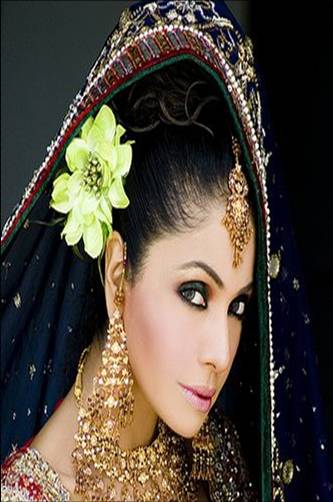
Brides go for different hairstyles to suit different wedding events. There are many options to choose from. The choice of a particular hairstyle depends on the outfit the bride will wear for a particular wedding event. Many traditional rituals require the bride to cover her head with a veil. This may limit some hairstyle and decorations options.
Planning: Once the bride and her family come to know about the fixed wedding date, planning starts. The bride starts planning her outfits, jewelry, cosmetics and hairstyles. The family gets more involved in planning various wedding ceremonies.
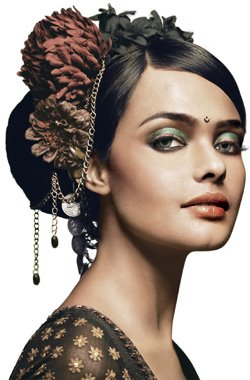
Planning hairstyle: The hairstyle is decided well in advance keeping in mind the personality of the bride, the shape of her face, her height and her outfit. If the bride wishes to go for an updo and doesn’t have long hair, she starts growing her hair few months before the wedding. But if the days left are few, she goes for extensions or false hair to add volume and length to her hair. Many times the height of the groom is also taken into consideration while choosing the bride’s hairstyle.
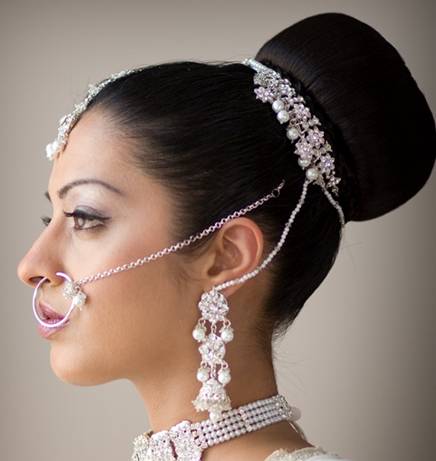
If the groom is very tall compared to the bride, a hairstyle that adds height to the bride is usually chosen. Such a style comprises of a hair updo usually a bun adorned with flowers.
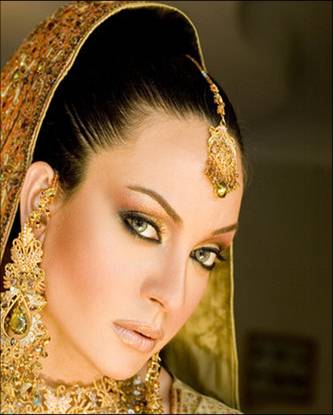
Hair adornment: Flowers, beads, sequins, glitters, diamante clips, hair pins, hair jewelry and hair stick are all used to adorn the bridal hairstyle.
- Flowers
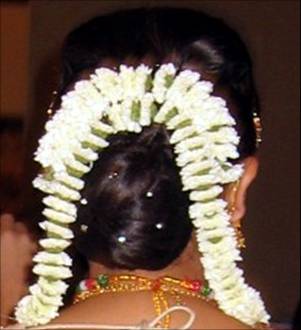
All brides go for flower adornment. Besides beautification, flowers also have a functional aspect. Strings of flowers, usually jasmine, adorned around the bun helps the veil to stay in place by means of hair pins.
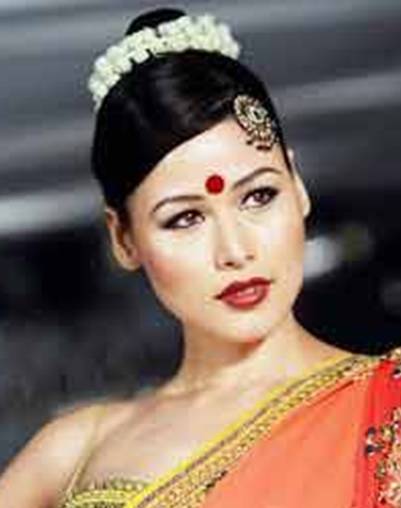
The floral strings can be attached in a number of ways. It may be encircled around the bun as a single string, or as multiple strings.
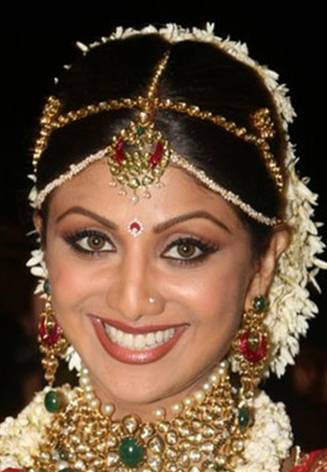
In the case of South Indian weddings, the bride does not puts the veil on her head which leaves her hair exposed thus eliminating the chances of veil interrupting with the hairstyle. Multiple floral strings are attached to the bun which may be placed at the nape, high up or at the middle depending on what suits the bride. The floral strings may also hang loose over both the shoulders.
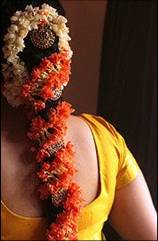
Flowers can also be used to adorn the hair braided into a plait. The plait is decorated completely with flower strands.
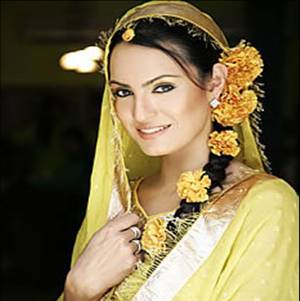
Indian Muslim and Punjabi brides often go for hair braided into two plaits both hanging over the shoulders in the front. The plaits are adorned with flowers.
- Bridal hair jewelry
Bridal hairstyles are incomplete without bridal hair jewelries. These not only adorn the hairstyle but are also essential bridal jewelry. A bridal hair jewelry comprises of beads, jewel comb, jewel hair pins, Maang tika, Tiara, Strands of pearls and many more.
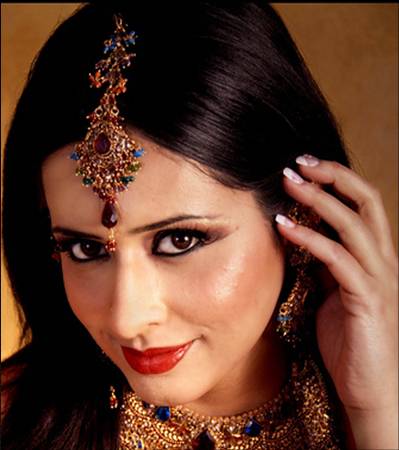
A maang tika is a traditional bridal hair jewelry that consists of two parts. The maang ( string ) rests on the center hair parting via small hook that allows it to get attached to the hair. Whereas the tikka (pendant) rests on the forehead.
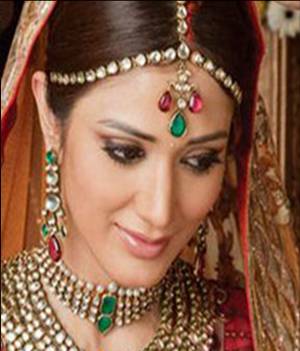
There are many variations in the traditional bridal maang tika. A maang tika is often clubbed with two strings made of pearl or simple chains that run across the hairline at the forehead and are attached to the hair behind the ears on both the sides via hook.
A maang tika is not only worn by the bride but it is also the most popular hair ornament worn by the bridesmaids.
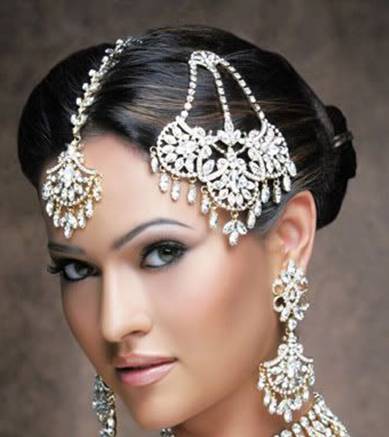
In addition to maang tika, there are many other hair jewelry pieces that are attached with the hair. One such a piece of jewelry is quite similar to the maang tika which is also attached to the hair. The difference lies in the placement and thickness of the jewelry. These are wider than maang tika and are placed on either side of the central hair parting. This piece of hair jewelry is more popular among the muslim brides.
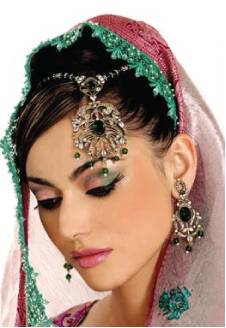
There are many variations in maang tika available. The thickness of the chain can vary. There are maang tikas which are single piece and similar in design and pattern throughout the length.
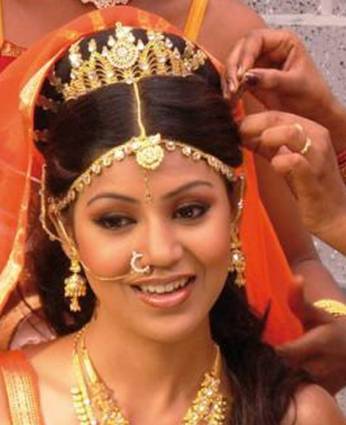
Bridal tiaras are not new to Indian brides. There are mythological evidences which show how the queens and princesses in India used to adorn their hair with beautiful tiaras. The tiaras used to have multiple strands that use to cover the entire head.
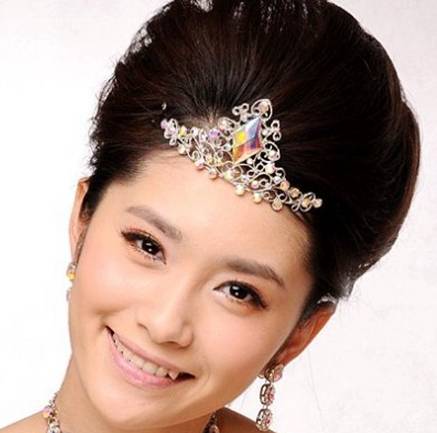
Even today tiaras are popular hair ornaments among Indian brides.
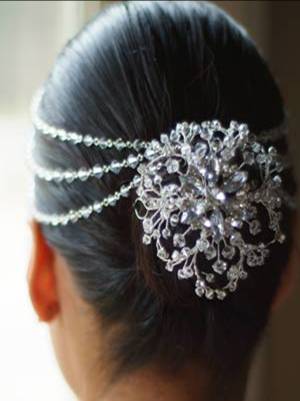
Jeweled clips are often used to fix up the hairdo. These are also decorative hair pieces.
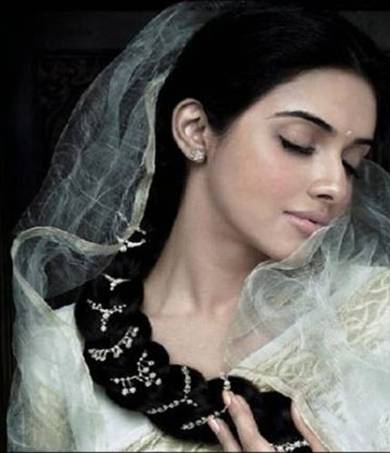
Decorative hair pins and clips are also used to adorn the plait. These are attached as separate piece throughout the braided plait.